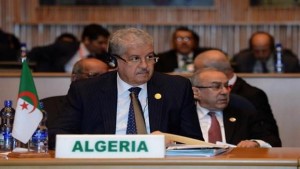 Robert Holley, a US former diplomat on Monday accused the Algerian regime of shilly shallying and of using perverse tactics to delay the UN-sponsored settlement process of the Western Sahara conflict
Robert Holley, a US former diplomat on Monday accused the Algerian regime of shilly shallying and of using perverse tactics to delay the UN-sponsored settlement process of the Western Sahara conflict
The Algerian regime continues to create diversions and to resort to perverse schemes, although it is fully aware that this only adds to the confusion and hampers the UN efforts seeking a final and consensual settlement of the territorial conflict, said Robert Holley a specialist of the Maghreb region.
If Algeria was honestly and earnestly interested in resolving the Sahara issue fairly, it would have heeded the repeated calls made by the Security Council for a decade, urging for a political solution of compromise, Holley said in comments on the speech delivered by Algerian Prime Minister Abdelmalek Sellal Sunday before the 25th session of the AU in Johannesburg, South Africa.
In the same vein, US expert Paul Jordan believes that Algeria has every interest to back in good faith the UN process seeking a political, sustainable, realistic and mutually acceptable settlement to the Sahara issue.
Commenting on the Algerian regime’s vain attempts to involve the African Union in the settlement process and on the Algerian Prime Minister’s speech, Jordan recalled that the United Nations has repeatedly called on the parties to negotiate in order to reach a realistic solution.
The US expert, alluding to the Moroccan autonomy plan for the Sahara, also recalled the conclusions reached by former Personal Envoy of the UN Secretary General for Western sahara, Peter Van Walsum.
Peter Van Walsum who had deemed the self-determination referendum unworkable had once stated: “the main reason why I find the status quo intolerable is that this status quo is too readily accepted, not only by uncommitted spectators from far away countries, but also by the unconditional supporters of the Polisario Front, who have not experienced themselves life in the camps, but who are convinced that those who live there would rather stay there indefinitely instead of opting for a negotiated solution short of full independence.”
